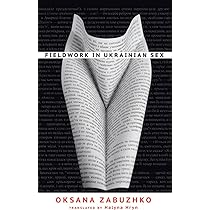
Ukrainian/East European culture @UCLSSEES. Translator of 🇺🇦 literature. @BritishAcademy_ Fellow 2024-25.
How to get URL link on X (Twitter) App


 After his death in Petersburg, Shevchenko was reburied in Ukraine. The authorities feared his grave at Kaniv could become the focus for revolt. His monument was guarded by soldiers on the anniversaries of his birth/death to stop gatherings (here it's 1914, his centenary). 2/5
After his death in Petersburg, Shevchenko was reburied in Ukraine. The authorities feared his grave at Kaniv could become the focus for revolt. His monument was guarded by soldiers on the anniversaries of his birth/death to stop gatherings (here it's 1914, his centenary). 2/5 

 Next, Nina Murray, translator of some enormous novels (Zabuzhko's Museum of Abandoned Secrets, Lutsyshyna's Ivan & Phoebe) and of Lesia Ukrainka's feminist modernist masterpiece Cassandra for @HURI_Harvard. Excerpt below @ukrlondonreview londonukrainianreview.org/posts/cassandra
Next, Nina Murray, translator of some enormous novels (Zabuzhko's Museum of Abandoned Secrets, Lutsyshyna's Ivan & Phoebe) and of Lesia Ukrainka's feminist modernist masterpiece Cassandra for @HURI_Harvard. Excerpt below @ukrlondonreview londonukrainianreview.org/posts/cassandra



 An excerpt from my forthcoming translation of Maik Yohansen's brilliantly eccentric avant-garde landscape novel on @StatORec. You can pre-order from @HURI_Harvard here 2/4 https://t.co/fQzJM11rNfhup.harvard.edu/catalog.php?is…
An excerpt from my forthcoming translation of Maik Yohansen's brilliantly eccentric avant-garde landscape novel on @StatORec. You can pre-order from @HURI_Harvard here 2/4 https://t.co/fQzJM11rNfhup.harvard.edu/catalog.php?is…https://twitter.com/holosameryky/status/1220043602178531328It's a brilliant poem, shifting between praise for the Caucasian peoples' resistance & searing satire of imperial hypocrisy, as Shevchenko ironically adopts the voice of the coloniser. Translations by John Weir bit.ly/3RghAgR and Vera Rich bit.ly/3CaoYWC 2/

 Here is a short thread on Lesia Ukrainka’s time in Vienna, based on Tamara Hundorova’s fantastic forthcoming book, which I have the honour to be translating in Vienna through the @IWM_Vienna's Paul Celan Translation Programme 2/
Here is a short thread on Lesia Ukrainka’s time in Vienna, based on Tamara Hundorova’s fantastic forthcoming book, which I have the honour to be translating in Vienna through the @IWM_Vienna's Paul Celan Translation Programme 2/ 

 It was meant to provide modern, spacious conditions for writers and foster a creative community. It is one of many impressive modernist buildings in Kharkiv. It was designed in the shape of a Cyrillic letter 'C' for 'слово' - 'word'. 2/
It was meant to provide modern, spacious conditions for writers and foster a creative community. It is one of many impressive modernist buildings in Kharkiv. It was designed in the shape of a Cyrillic letter 'C' for 'слово' - 'word'. 2/ 

 In 1965, he led probably the first anti-government public protest in the USSR. At the premier of Parajanov’s film Shadows of Forgotten Ancestors in Kyiv, he stood up with poet Vasyl Stus and activist Viacheslav Chornovil to protest recent arrests of Ukrainian writers. 2/6
In 1965, he led probably the first anti-government public protest in the USSR. At the premier of Parajanov’s film Shadows of Forgotten Ancestors in Kyiv, he stood up with poet Vasyl Stus and activist Viacheslav Chornovil to protest recent arrests of Ukrainian writers. 2/6 



 Taras Shevchenko's poetry is a model of anti-colonial cultural resistance, & not only about Ukraine, see his brilliant 'Caucasus', for example. Vera Rich's translation: bit.ly/3qV4TOH See also Rory Finnin's analysis @CamUkrainistyka: jstor.org/stable/4214123 2/8
Taras Shevchenko's poetry is a model of anti-colonial cultural resistance, & not only about Ukraine, see his brilliant 'Caucasus', for example. Vera Rich's translation: bit.ly/3qV4TOH See also Rory Finnin's analysis @CamUkrainistyka: jstor.org/stable/4214123 2/8